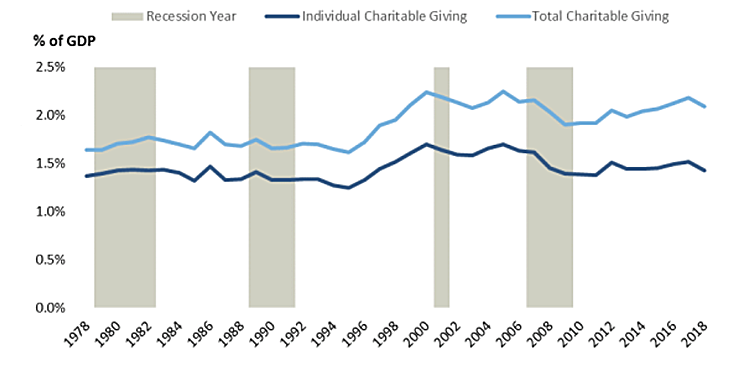Fundraising During Coronavirus and Economic Uncertainty
There is no question that we, who work in the non-profit world, are in unchartered waters with the coronavirus and the economic uncertainty it is causing. We’ve heard over and over from clients that they are struggling to make decisions because the situation is changing minute by minute.
As everyone scrambles to implement plans for dealing with operational disruptions and closures, staff and volunteer shortages, and increased demand for their services, one thing is clear–the work must go on. The organization must remain true to its mission. And to do that, fundraising must continue.
History shows us that economic downturns can be survived. Yes, giving may decrease, but it won’t stop and for some non-profits it could be a period of fundraising success.
We encourage all of our non-profit friends to look beyond this crisis to the future and offer the following recommendations to help traverse this stormy period and not just survive–but arrive safely on the other side with even stronger donor relations and engagement.
Keep fundraising. Just like in good times, retention is key. It costs more to get a gift from a lapsed donor than one who has given recently, so it’s critical that you stay in the hearts and minds of your current donors. Giving has NEVER ceased completely, even during the recession in 2008-2009. To get the gift, you have to ask. So, keep asking.

Tell your story and detail the need. Be honest with your current donors. Outline the impact the coronavirus and the economic downturn are having on your organization. If you’re experiencing increased demand for your services, let them know. If you’re doing everything you always do and with fewer people, let them know. Take a storytelling approach to give donors the opportunity to connect emotionally with you during this time of need.
Explore your lapsed donors for reactivation. Depending on the kind of services you provide, now may be a perfect time to ask them to re-engage.
Reach out to major gift donors personally. Find out if they will be able to continue their support at prior levels. They may be able to move annual gifts to earlier in the year to help offset canceled events or other face-to-face fundraising activities.
Evaluate your acquisition efforts. It could be a great time to introduce new donors to your mission. Especially if you’re experiencing increased demand for your services, or investing in new ways to deliver on your mission. Be more strategic and selective about the new audiences you solicit during the crisis. If you are soliciting event goers or using outside lists in your acquisition appeals, consider adding more data points to gain insights on the most likely responders to manage your expense. Evaluate channels (direct mail, digital media, social media, email) for their ability to leverage these data insights to reach new audiences who look like current donors, have the capacity to give and have demonstrated a connection to your cause.
Brainstorm ways to engage with donors online. If possible, stay top-of-mind by using video to illustrate that your organization is continuing to deliver on its mission even with reduced staff and volunteer support.
Articulate your financial responsibility. When the economy is slow, donors are especially anxious to know that their funds are being used wisely.
Plan for the future. This crisis will pass, so start planning now for that day and be ready to maximize the return to normal. Think of ways to show gratitude to those that stepped up during this challenge. Make personal phone calls, schedule recognition activities or find ways to show gratitude to these donors. Share with them the impact of their support during the crisis and you may just find your next major donors.
Don’t forget fundraising basics. Make your appeals personal, emphasize the importance of the donor and their direct impact on the good work you’re doing, thank the donor repeatedly, and ASK FOR THE GIFT!
Most of all, as the English say, Keep Calm and Carry On! Keep your mission at the forefront of your decision-making and your eye on the future and you will find yourself with a healthy fundraising program that’s ready to take on the next challenge.
